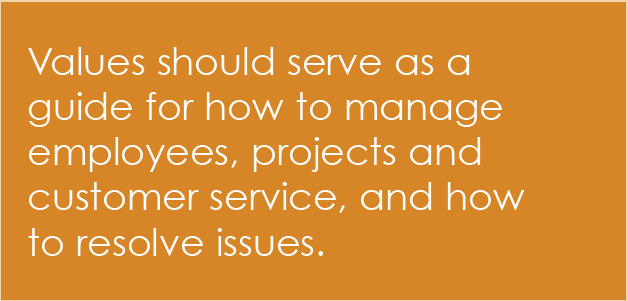Do your employees know your construction company’s core values? Are they (and you) applying these values to daily operations and decision making? Are you using the values to build your brand and reputation in the marketplace?
If you had a hard time answering the above questions, it may be time to revisit the concept of having company core values and prioritizing them on every job.
Stand For Something
Core values, or business principles, should be more than a superficial exercise in platitudes. When a construction business establishes a set of values, that company is proclaiming what they stand for and how they do business.
The values should serve as a guide for how to manage employees, projects and customer service, and how to resolve issues. They should be used as a litmus test when evaluating potential projects, clients, partners and job candidates to determine fit. They’ll certainly be used by project owners to determine which contractors live up to their promises.
Employees and job candidates also measure employers by their values. In 2017, Forbes magazine reported that company culture is so important to Millennials — who were estimated to make up roughly half the working population by this year — that core values are becoming an important tool for attracting and retaining talent.
So, are you putting core values in action or are you just paying lip service to them? As an example, let’s look at “safety,” a value adopted by many contractors. A company that prioritizes safety should base every decision, big or small, on that value.
Leadership must be committed to training and procedures that ensure all employees go home uninjured. Employees must know they’re responsible for their own safety and the safety of those around them. If a design or work practice is perceived to be unsafe, a contractor committed to safety won’t proceed until the issue is resolved. After all, safety must take priority — even over schedule and profit.
Select a Set
So, what are values — literally? Common examples include Teamwork, Fun, Innovation, Integrity, Honesty, Courage, Accountability, Community, Transparency, Quality and Safety.
After you’ve selected a set of three to seven core values, the next step is to ensure they’re embedded into your construction company’s culture. Clearly define how the company interprets each value. Include a sentence describing the value and how you apply that value. For example, “Safety. Provide an environment in which our employees can do work without getting hurt.”

Include each core value as a topic in training programs for new hires and use a “core value checklist” in annual reviews. You might even create a rewards program for employees based on how they exemplify one or more company values. Deciding which values best characterize the company should be a topic of discussion for you and your management team. Sometimes core values need to be refreshed as a company grows and evolves, so revisit them regularly during strategic planning meetings.
Build Credibility and Trust
When contractors meet or exceed expectations set by their values, they build credibility and trust on jobsites and in their respective markets. And when they don’t live up to their values — well, customers and project partners will notice. Once yours are established, be sure to “walk the talk.”
We welcome the opportunity to put our construction industry expertise to work for you. To learn more about how our firm can help advance your success, please contact Dave Wolfenden at (302) 254-8240.

